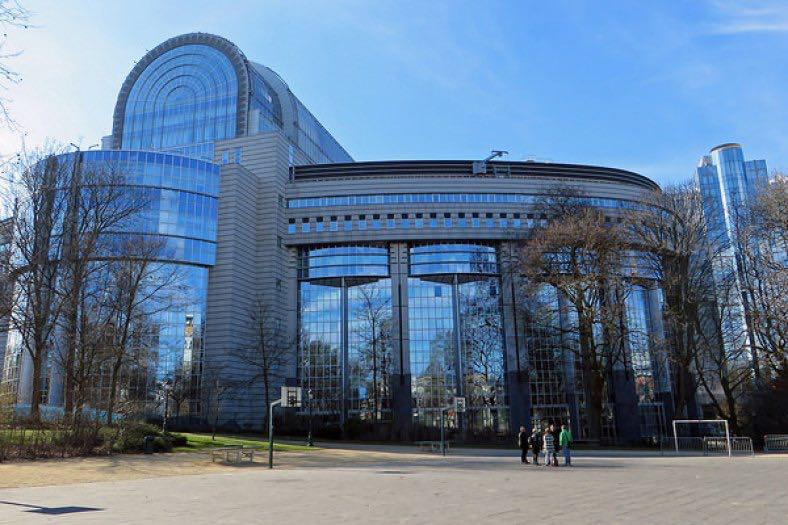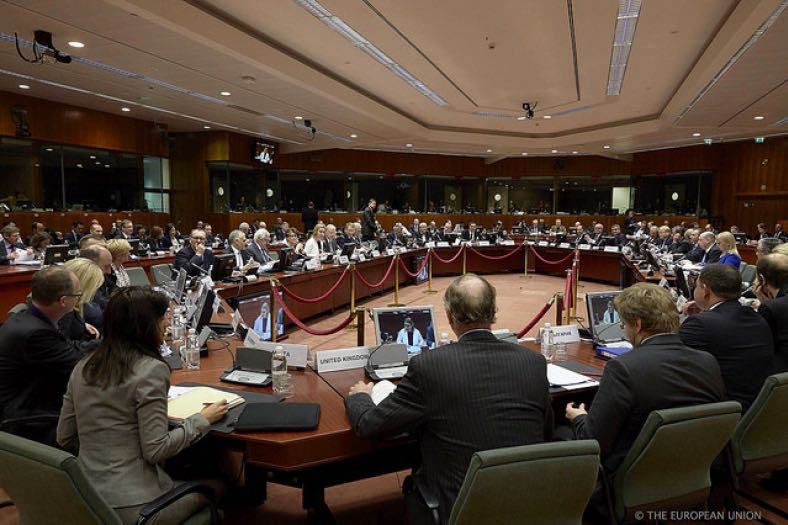Kristof Clerix, Belgium, works as an investigative reporter for the Belgian weekly news magazine Knack.
Spy war behind the scenes of the Brussels diplomacy
At least three senior officials from sensitive European departments have in recent years been called back from Brussels by their country of origin, on suspicion of having had contacts with Russian intelligence, MO* has learned from several knowledgeable sources in the world of security and intelligence. These kind of affairs are handled behind the scenes of the diplomatic world in utmost discretion.
On April 9, the New York Times revealed that all NATO “partner nations” have 9 months time to limit the size of their delegations to maximum 30 members. Officially the decision is meant to better manage the relations with the growing number of partner nations – meanwhile 41 countries.
‘This decision is very strange and smacks strongly of the Cold War era.’
But according to the New York Times, citing ‘Western officials’, the move also followed a confidential assessment by the alliance’s Civilian Intelligence Committee that intelligence agents had been part of Russia’s delegation. Shrinking the number of diplomats within Russia’s NATO mission considerably would hardly eliminate the risk of espionage but ‘could make the problem easier to manage’, the newspaper reports.
‘This decision is very strange and smacks strongly of the Cold War era’, the Russian Foreign Ministry said.
Ambassador Alexander Grushko, permanent representative of the Russian Federation to NATO, said that ‘in a normal diplomatic practice there are no standards regarding the size of diplomatic missions’ and was ‘expecting additional explanations from the drafters’.
Grushko also said: ‘The speculations by the author of the New York Times publication will remain on his conscience.’
‘One out of three Russian diplomats in Brussels is a spy’
The website of the Russian mission to NATO today mentions 37 members, but not so long ago the number was much higher. ‘Until the Crimea crisis in March 2014, the Russian mission had about 70 members. It was the biggest mission to NATO’, a knowledgeable source said.
Western intelligence services assume that roughly half of the Russian diplomats accredited to NATO would be spies.
Western intelligence services assume that roughly half of the Russian diplomats accredited to NATO would be spies.
Already in 2009 Alain Winants, former head of the Belgian State Security, said in MO* that ‘the level of presence and the nature of the activities of the Russian intelligence services are the same as during the Cold War’. Also according to Winants, some 150 Russian diplomats were working in Belgium and one out of three would in fact be an intelligence officer.
In its Annual Report 2010, the State Security sums up the main priorities of the Russian intelligence in Belgium: the Atlantic defense policy, European politics and economic policy and the Russian speaking community in Belgium.
Both the Russian foreign intelligence service SVR and the military service GRU are active in Brussels. A source within European security circles: ‘We know that during the Ukraine crisis, the GRU has fully “carte blanche” regarding running intelligence operations in Brussels. The SVR is playing in the background. After all, we are in a “war situation”, and in such a military crisis situation, the military intelligence service comes first.’
Another source is more nuanced: ‘For years, the GRU has always come in the last place, compared to the FSB or the SVR. But it is true that because of the Ukraine crisis, the GRU now is more heard in the Kremlin.’

The European Parliament in Brussels is a logical target for foreign intelligence services.
Diamond Geezer CC BY NC ND 2.0
Suspicious contacts
Not only Russian diplomats accredited with NATO are under scrutiny of the Western counter espionage. Also a number of Russians accredited with the European Union have aroused their interest.
‘Also within the European institutions operational activities by the Russian military intelligence service GRU have been observed’, MO* was told by Western intelligence circles. ‘It is clear that within those European entities not only economic information is collected by the Russian intelligence agents.’
As from the moment he took up his position as a diplomat at Russia’s mission to the EU a couple of years ago, X was monitored by the Belgian counter espionage. Within Western intelligence circles, his predecessor in that position, Y, was known as an intelligence officer of the Russian military intelligence service GRU. Chances were that Moscow again had sent a GRU officer to Brussels.
As from the moment he took up his position as a diplomat at Russia’s mission to the EU a couple of years ago, X was monitored by the Belgian counter espionage.
Western intelligence agencies had noticed that during his diplomatic mission in Belgium, Y had had several contacts with European officials of sensitive departments such as crisis management, the military pillar, the European Defense Agency and the military staff, MO* was told by several knowledgeable sources.
Among others, Y had contacted in Brussels a very high ranking militar from a South European EU member state; an Eastern European officer of the European Defense Agency; a high ranking officer from one of Belgium’s neighbouring countries; and a South European official working in crisis management.
Those suspect contacts have been examined and monitored by the security departments of the European institutions, in collaboration with the intelligence services of the concerned EU member states.
The Eastern European EDA officer e.g. was called back to his country. Also another contact person of Y, again an officer, was called back to his country of origin out of precaution.
The reason why you have never heard of these affairs before? They are handled behind the scenes of the diplomatic world in utmost discretion.
Protective measures
Against Y, who on his own initiative left Belgium at the end of his service period, no action was taken.
Also his successor X, the counter espionage noted, had all kinds of contacts with various people within the European institutions, ranging from the External Action Service (EEAS) to the European Parliament.
Of the handful of contacts that the counter espionage could identify, at least one has already been called back to his country of origin.
Of the handful of contacts that the counter espionage could identify, at least one has already been called back to his country of origin. According to Western intelligence services, X’ contacts in fact were operational contacts, as during the meetings X would take protective measures and every now and then would bring a present for his interlocutor – a well-known step in the classical recruitment method for future informants.
So far no official steps have been taken against X. But during a reception in the past year, Western diplomats told the Russian ambassador to the EU, Vladimir Chizhov, that X should take it easy.
X still holds his position in Brussels, as one of the 64 diplomats of the permanent representation of Russia to the EU.

The European Defense Agency (EDA). An officer of the EDA was called back to his home country, under suspicion of contacts with Russian intelligence.
© European Defense Agency
Provocation
Expelling spies by declaring them persona non grata (png) is a very sensitive issue in the bilateral relations between countries. During the Cold War, spies were expelled from Belgium regularly, but the png number significantly dropped after the Fall of the Berlin Wall. Only a few examples made headlines in the Belgian press.
Expelling spies by declaring them persona non grata is a very sensitive issue in bilateral relations.
In the aftermath of the affair around the Belgian Moroccan Abdelkader Belliraj, the Belgian State Security in 2008 had three Moroccan intelligence officers withdrawn from Belgium. And as a retaliation for the espionage affair around the Estonian senior official Herman Simm, the NATO headquarters in 2009 withdrew the accreditation of two Russian diplomats accused of espionage: Viktor Kochukov, head of the political department of Russia’s mission to NATO, and Vasily Chizhov, son of Russia’s ambassador to the EU.
As a result of an agreement between NATO and Belgium, the two Russians had to leave the country. Dmitri Rogozin, the then ambassador of Russia to NATO, called the measure a provocation, and said both diplomats had nothing to do with espionage. He called the accustations ‘invented’ and ‘irresponsible’.
Russians expelled in Poland and Germany
In the past months Russian diplomats have been expelled from different EU member states. In Germany a person suspected of being a GRU intelligence officer, who was accredited as a diplomat at the Russian consulate in Bonn, was allegedly caught when he tried to recruit an informant. He had to leave Germany.
In Poland, a Polish colonel and a Russian Polish lawyer were arrested on suspicion of espionage for the GRU. A Russian journalist of Russia Today is no longer allowed to work in Poland. In response, the Russian ministry of Foreign Affairs expelled four diplomats from the Polish embassy in Moscow because of ‘activities that are inconsistent with their status’.
MO* has contacted the Russian mission to the EU and mailed the article before publication but has not received any reaction.
Maak MO* mee mogelijk.
Word proMO* net als 2798 andere lezers en maak MO* mee mogelijk. Zo blijven al onze verhalen gratis online beschikbaar voor iédereen.
Meer verhalen
-
Report
-
Report
-
Report
-
Interview
-
Analysis
-
Report













 Oxfam België
Oxfam België Handicap International
Handicap International